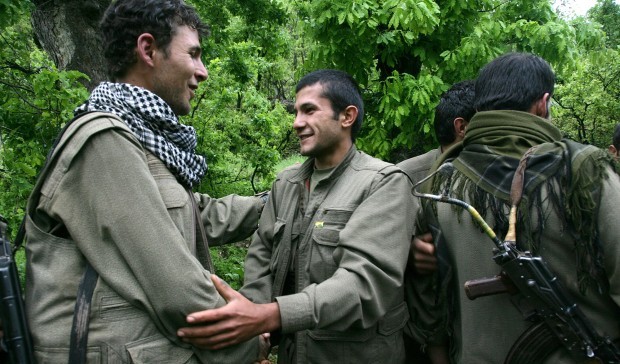
Kurdish fighters from the Kurdistan Workers’ Party (PKK) congratulate each other after arriving in the Heror area, northeast of Dahuk, 260 miles northwest of Baghdad, Iraq, on Tuesday, May 14, 2013. (AP Photo/ Ceerwan Aziz)
Bakhtiar Dogan, a spokesman for the People’s Defense Force (HPG)—the armed wing of the PKK—informed Asharq Al-Awsat that the withdrawing fighters had arrived in Iraqi Kurdistan, emphasizing that “the area where the fighters will settle is not under the control of the governments of Turkey, Iraq or Iran.”
“Due to the bad weather conditions and the suspicious movements of some unaffiliated Kurdish militias, the deployment’s arrival was delayed for nine days,” he revealed.
This step, which comes after the first group of 15 fighters arrived in Iraqi Kurdistan earlier this month, demonstrates the PKK’s serious efforts to withdraw from Turkey. Once all PKK fighters have left Turkish territory, the peace process will enter its third stage—namely, the disarmament of the PKK in exchange for constitutional guarantees for Turkey’s Kurdish community.
Jabbar Yawar, secretary-general of Kurdistan’s Peshmerga Ministry, claimed that the PKK’s pullback into Iraqi Kurdistan territories has raised a number of questions, emphasizing that according to the Iraqi constitution, Iraqi Kurdistan is part of the federal Republic of Iraq.
He stressed that “the PKK fighters will return to their former sites in the border zone between Iraq, Turkey, and Iran, which is part of the territories of Iraqi Kurdistan. Everyone is aware that due to its geographical topography, this area has never been under the control of the Kurdistan regional government or either of the three governments.”
Yawar also said: “When the fighters [first] settled in this area, they did not ask the permission of the KRG nor any of the governments in the region. They have been present in that area for ages; and this is a reality.”
“As far as the peace process is concerned, we in Kurdistan’s Peshmerga Ministry reaffirm our support for the peace process between the Turkish government and the PKK. Moreover, the steps that the PKK has taken towards peace, from ceasefire to withdrawal, will eventually lead to its disarmament and participation in the political process in Turkey. This is something which will contribute to achieving peace in this country,” he added.
Muhammad Diyari, a journalist with knowledge of the PKK, informed Asharq Al-Awsat that “this new stage does not mean the end of the rebellion, as the PKK leadership do not yet think that the time has come for the fighters to put down their arms.”
“Fighters retreating to Mount Qandil will keep their rifles and weapons until the PKK is granted sufficient constitutional guarantees to solve the Kurdish issue in Turkey,” he added.
Diyari emphasized that this stage might therefore be considered something of a temporary truce.
He emphasized that “the current stage is a transitional one that depends on future developments. Hence, the fighters, I believe, will keep their rifles and continue their struggle.”
Since it was founded in 1987, the PKK has been involved in a bloody armed conflict with the Turkish government over Kurdish rights. In an open letter issued last March, PKK leader Abdullah Öcalan proposed a long-awaited ceasefire, portraying this as a “new phase” in the Kurdish struggle.
